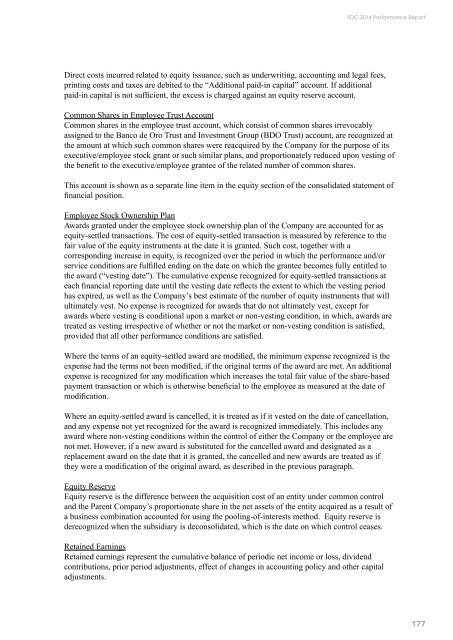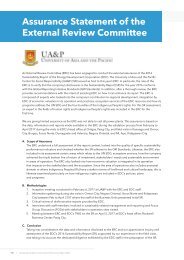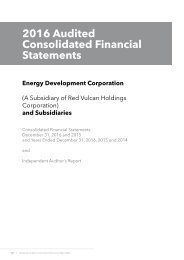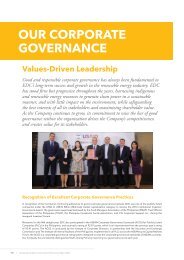EDC 2014 SR (UPDATED)
You also want an ePaper? Increase the reach of your titles
YUMPU automatically turns print PDFs into web optimized ePapers that Google loves.
<strong>EDC</strong> <strong>2014</strong> Performance Report<br />
Direct costs incurred related to equity issuance, such as underwriting, accounting and legal fees,<br />
printing costs and taxes are debited to the “Additional paid-in capital” account. If additional<br />
paid-in capital is not sufficient, the excess is charged against an equity reserve account.<br />
Common Shares in Employee Trust Account<br />
Common shares in the employee trust account, which consist of common shares irrevocably<br />
assigned to the Banco de Oro Trust and Investment Group (BDO Trust) account, are recognized at<br />
the amount at which such common shares were reacquired by the Company for the purpose of its<br />
executive/employee stock grant or such similar plans, and proportionately reduced upon vesting of<br />
the benefit to the executive/employee grantee of the related number of common shares.<br />
This account is shown as a separate line item in the equity section of the consolidated statement of<br />
financial position.<br />
Employee Stock Ownership Plan<br />
Awards granted under the employee stock ownership plan of the Company are accounted for as<br />
equity-settled transactions. The cost of equity-settled transaction is measured by reference to the<br />
fair value of the equity instruments at the date it is granted. Such cost, together with a<br />
corresponding increase in equity, is recognized over the period in which the performance and/or<br />
service conditions are fulfilled ending on the date on which the grantee becomes fully entitled to<br />
the award (“vesting date”). The cumulative expense recognized for equity-settled transactions at<br />
each financial reporting date until the vesting date reflects the extent to which the vesting period<br />
has expired, as well as the Company’s best estimate of the number of equity instruments that will<br />
ultimately vest. No expense is recognized for awards that do not ultimately vest, except for<br />
awards where vesting is conditional upon a market or non-vesting condition, in which, awards are<br />
treated as vesting irrespective of whether or not the market or non-vesting condition is satisfied,<br />
provided that all other performance conditions are satisfied.<br />
Where the terms of an equity-settled award are modified, the minimum expense recognized is the<br />
expense had the terms not been modified, if the original terms of the award are met. An additional<br />
expense is recognized for any modification which increases the total fair value of the share-based<br />
payment transaction or which is otherwise beneficial to the employee as measured at the date of<br />
modification.<br />
Where an equity-settled award is cancelled, it is treated as if it vested on the date of cancellation,<br />
and any expense not yet recognized for the award is recognized immediately. This includes any<br />
award where non-vesting conditions within the control of either the Company or the employee are<br />
not met. However, if a new award is substituted for the cancelled award and designated as a<br />
replacement award on the date that it is granted, the cancelled and new awards are treated as if<br />
they were a modification of the original award, as described in the previous paragraph.<br />
Equity Reserve<br />
Equity reserve is the difference between the acquisition cost of an entity under common control<br />
and the Parent Company’s proportionate share in the net assets of the entity acquired as a result of<br />
a business combination accounted for using the pooling-of-interests method. Equity reserve is<br />
derecognized when the subsidiary is deconsolidated, which is the date on which control ceases.<br />
Retained Earnings<br />
Retained earnings represent the cumulative balance of periodic net income or loss, dividend<br />
contributions, prior period adjustments, effect of changes in accounting policy and other capital<br />
adjustments.<br />
177
















